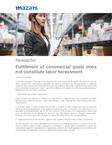
Fulfillment of commercial goals does not constitute labor harassment
1. Generalities about labor harassment:
Labor harassment, defined in Article 2 of Law 1010, is materialized in the modalities of Labor Mistreatment, Labor Persecution, Labor Discrimination, Labor Disturbance, Labor Inequity and Labor Disprotection.
In all these cases, in order to determine whether a conduct of labor harassment has occurred, the following must be established: (i) accredit the conduct, by action or omission; (ii) verify that it is of a persistent and demonstrable nature; (iii) that it occurs in the context of an employment relationship and; (iv) that there is an intention to generate fear, intimidation, terror or anguish, cause labor damage, generate demotivation at work, or induce the resignation of the affected person.
2. Inappropriateness of the cassation appeal in the special judicial process of labor harassment:
On this occasion, the Court reiterated that the judicial proceeding provided for in Article 13 of Law 1010 to resolve cases of labor harassment, constitutes a special labor proceeding on which the extraordinary appeal in cassation is not applicable, since the norm that regulates it (Law ibidem) only contemplates the possibility of filing an appeal against the judicial decision.
Likewise, in order for the complainant to be able to apply the preventive measures and protection mechanisms indicated in article 11 of the aforementioned law, and for the sanctions provided therein to be applied, he/she must file the respective complaint before the competent authority, either the Labor Coexistence Committee or the Ministry of Labor, which must establish the facts constituting the harassment.
Consequently, when the special procedure is not used, the only means of control applicable in cases of labor harassment will be the ordinary labor proceeding, on which the appeal in cassation is admissible, by virtue of Article 2 of the Labor and Social Security Procedural Code.
3. Conduct that does not constitute Labor Harassment.
Article 7 of Law 1010 indicates those conducts that have the character of labor harassment, among which are the acts of physical aggression and the humiliating disqualification of the proposals or opinions of the coworkers.
In turn, Article 8 of the same law establishes the conducts that do not constitute labor harassment, such as the formulation of reasonable demands of labor loyalty or business loyalty and the demands aimed at the fulfillment of the obligations and duties of the worker, the company's regulations, and the clauses of the employment contracts.
The Court stated that in the business environment, conflicts often arise from the employer's organizational action or the exercise of its disciplinary power over workers, however, this does not imply that every demand, order, request or action that occurs in the workplace constitutes harassment.
In conclusion, when the employer's orders are aimed, for example, at meeting established business goals, are not detrimental to the worker's dignity and are in accordance with the position or the work performed by the worker, they do not constitute harassment at work.


